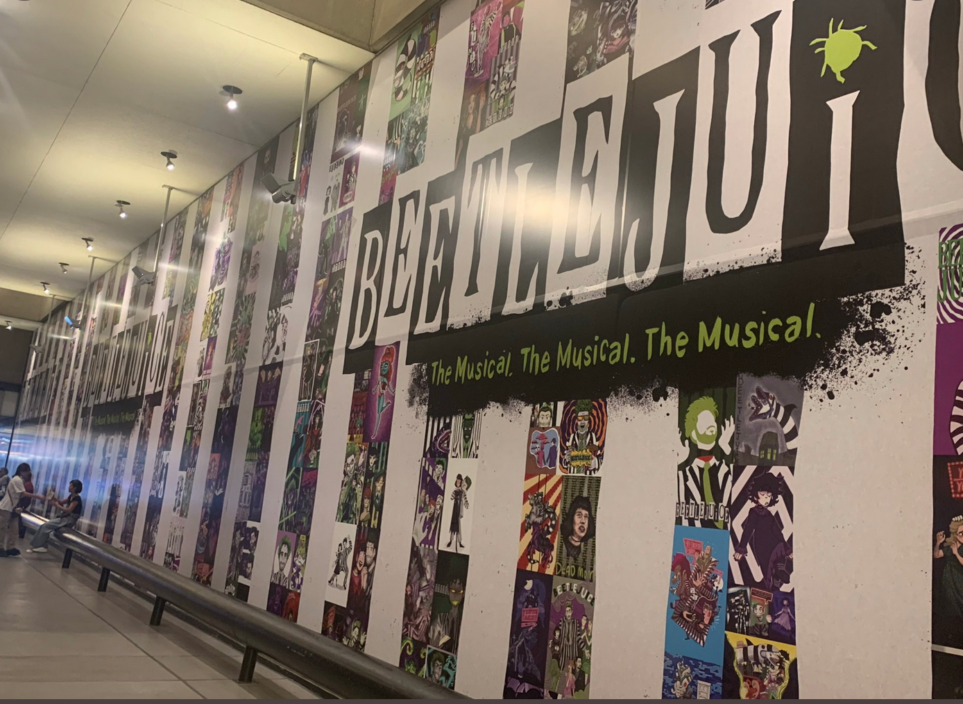Welcome to today’s edition of ShentonSTAGE Daily, again from New York, where I’ve managed to miss most of “last week’s national state of mourning back home for the Queen’s passing.
Viewed from this side of the Atlantic, it has been weird to observe my home country become paralysed by an event — the death of a 96-year-old woman — that is simply so much a part of everyday life, however much we admire the person who, by virtue of an accident of High Birth, was forced to give her entire life to service, but did so with an unimpeachable sense of duty and responsibility.
Yet her death is perhaps a proxy for all our griefs; a reminder of the mothers and grandmothers we’ve lost along the way. And perhaps it forges a sense of community, certainly in the bizarre spectacle of people queuing through the night for the chance to view her coffin lying in state for a few minutes. (Maybe a part of me envies their ability to even do so; thanks to my back, I cannot stand for extended periods anymore, extended in this case meaning anything more than five minutes, let alone five or ten hours)
It put me in mind of durational theatre — where part of the thrill is to be able to say you lasted the course. Certainly, one of my greatest-ever theatre experiences was Taylor Mac’s 24-DECADE HISTORY OF POPULAR MUSIC, which I saw them perform at St Ann’s Warehouse in Brooklyn in 2016 in one 24 hour sitting. As I wrote in The Stage at the time,

“Did that really happen? Did I actually get through that? Last Saturday I sat down in a downtown theatre in New York – St Ann’s Warehouse on the Brooklyn waterfront by Manhattan Bridge – with 650 other men and women at noon, and I didn’t emerge until noon the following day. I went to see Taylor Mac, a one-of-a-kind performance artist and activist performing A 24-Decade History of Popular Music. By the time it ended, the previous 24 hours seemed a happy, hazy blur: like the jet lag you experience after a flight to Australia that takes almost as long, but with much more stimulation – and good music – along the way….
…Across those 24 (mostly) sleepless hours, I heard Mac offer a provocative, personal and unique history, not just of music across the years between 1776 and 2016, but also of the American nation itself – and of both Mac’s own and all of our places in it. More than any theatrical experience I’ve ever had, this was a true work of community theatremaking and theatre building, and we were all in it together. As we are in life.”
That, of course, is also the appeal of live theatre: that we are never watching it in isolation, on-demand in our private spaces on our computer screens or home video set-ups, but breathing the same air as the performers and our fellow audience members.
That simple action, of course, became a high-risk activity during COVID, as that is precisely how it was transmitted — in the air of shared spaces. Now we’ve come to live with it, thanks to vaccines and other preventative measures, like mask wearing.
Speaking of which: I was particularly pleased this weekend to attend two shows in New York which still made mask wearing mandatory for audience members, at Off-Broadway’s Asylum Theatre and at Manhattan Theatre Club’s Broadway address, the Samuel J Friedman Theatre.
This proves that venues ARE able to set their own rules. SOLT constantly asserted during the crisis that it was NOT for them to impose any rules, but they could only make recommendations, which were to SUGGEST that audience members wear them. They could, had should, have gone much further; the Broadway League created its own mask mandate, and only recently downgraded it into a recommendation. But some venues are still insisting on it, and good on them.
NEW YORK NOTES
During my six night stay in New York, from where I return later today, I clocked up seeing nine shows (and one film in a cinema — the latter, THE WOMAN KING, has a cast with a rich theatrical pedigree, including the magnificent Viola Davis in the title role, and our very own Sheila Atim).
I‘ve already reported on some of them here; of the nine shows I saw, eight were on Broadway, one off; and of the Broadway entries, five were repeats of shows I”d seen before, with only three of them new productions. Partly that was because this trip was a birthday treat to myself, so I wasn’t specifically ‘working’, and I enjoy nothing more than going to see shows I already love again.
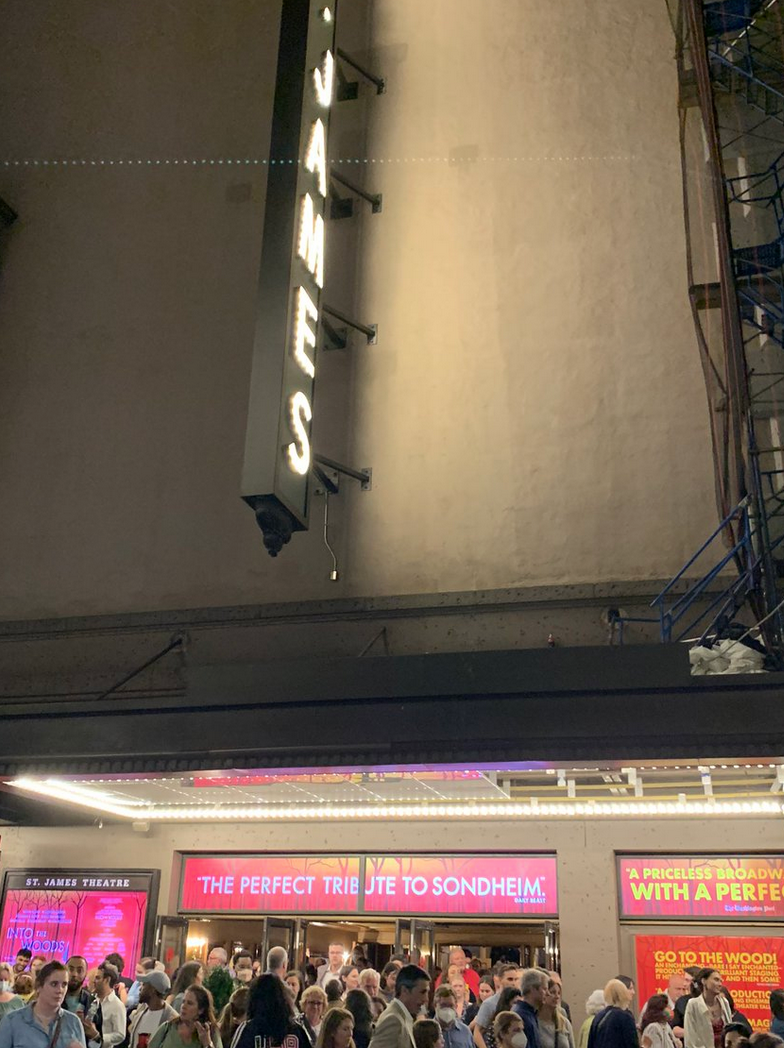
The biggest treat in this regard was revisiting the Encores! spring production of INTO THE WOODS, which I first saw at New York City Center in May during its two week run there, and has now successfully transferred to Broadway’s St James Theatre, where its limited run has been twice extended and will now conclude on January 8.
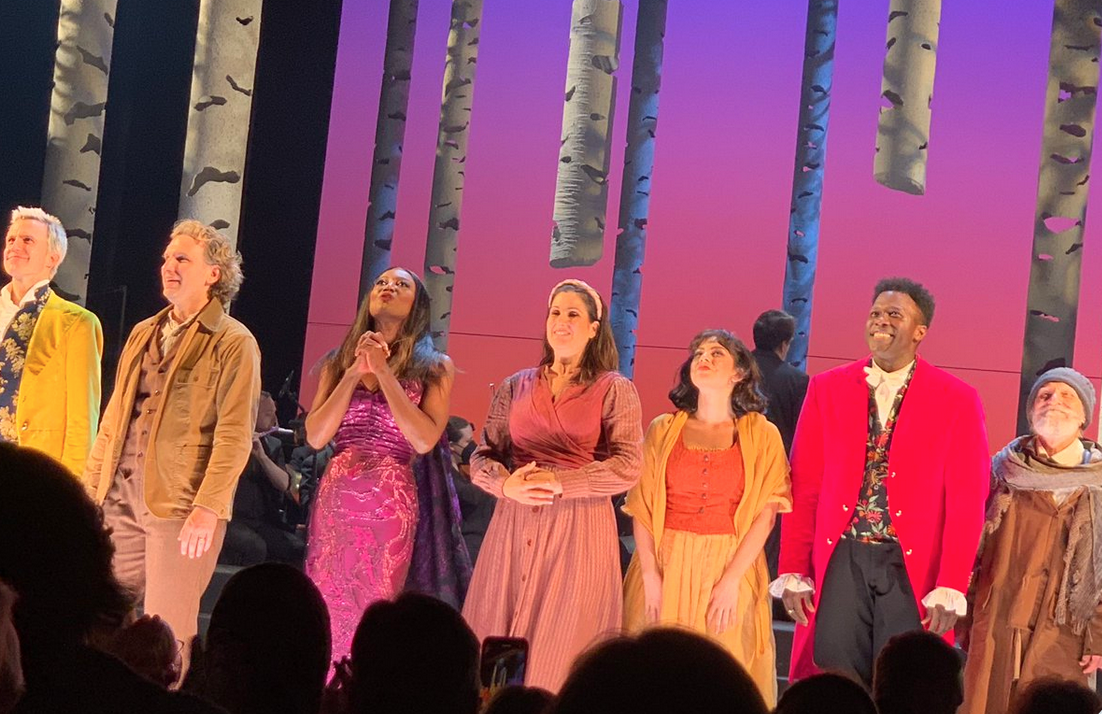
There have been significant cast changes along the way, from City Center to Broadway and now during the Broadway run itself. I was delighted, at the performance I attended, to catch Stephanie J Block (who has replaced Sara Bareilles as the Baker’s Wife), Sebastian Arcellus (replacing Neil Patrick Harris as the Baker), Patina Miller (replacing Heather Headley as the WItch), and Krysta Rodriguez (replacing Denée Benton as Cinderella) joining original principals Gavin Creel Cinderella’s Princes, David Patrick Kelly as the Narrator/Mysterious Man and the ever-invaluable Annie Golden as Cinderella’s Mother/Grandmother/Giant’s Wife.
All of them are minor Broadway royalty; Broadway has such a rich casting pool that you are always guaranteed a cast that is worth seeing.
The recent Terry Gilliam production at Theatre Royal Bath, which I previously wrote about here, does more spectacular scenic interventions, but sometimes less is more, and this pared-back Broadway version — the show’s third outing there, after its original production in 1987 and another revival in 2002 — allows the cast to take the audience on a journey into the soul of the piece. It’s devastatingly simple and simply devastating.
BEETLEJUICE OUTLIVES THE MUSIC MAN, WHICH IT OUSTED
Last night I re-visited another show that was forced to close prematurely, not because of COVID, but because of the actions of another theatre producer, who wanted to book its home for his next show; but has since re-opened at another venue, and — as it happens — managed to avoid COVID disruption in the meanwhile, simply sitting out the crisis without rent to pay on a theatre it was unable to hold performances at.
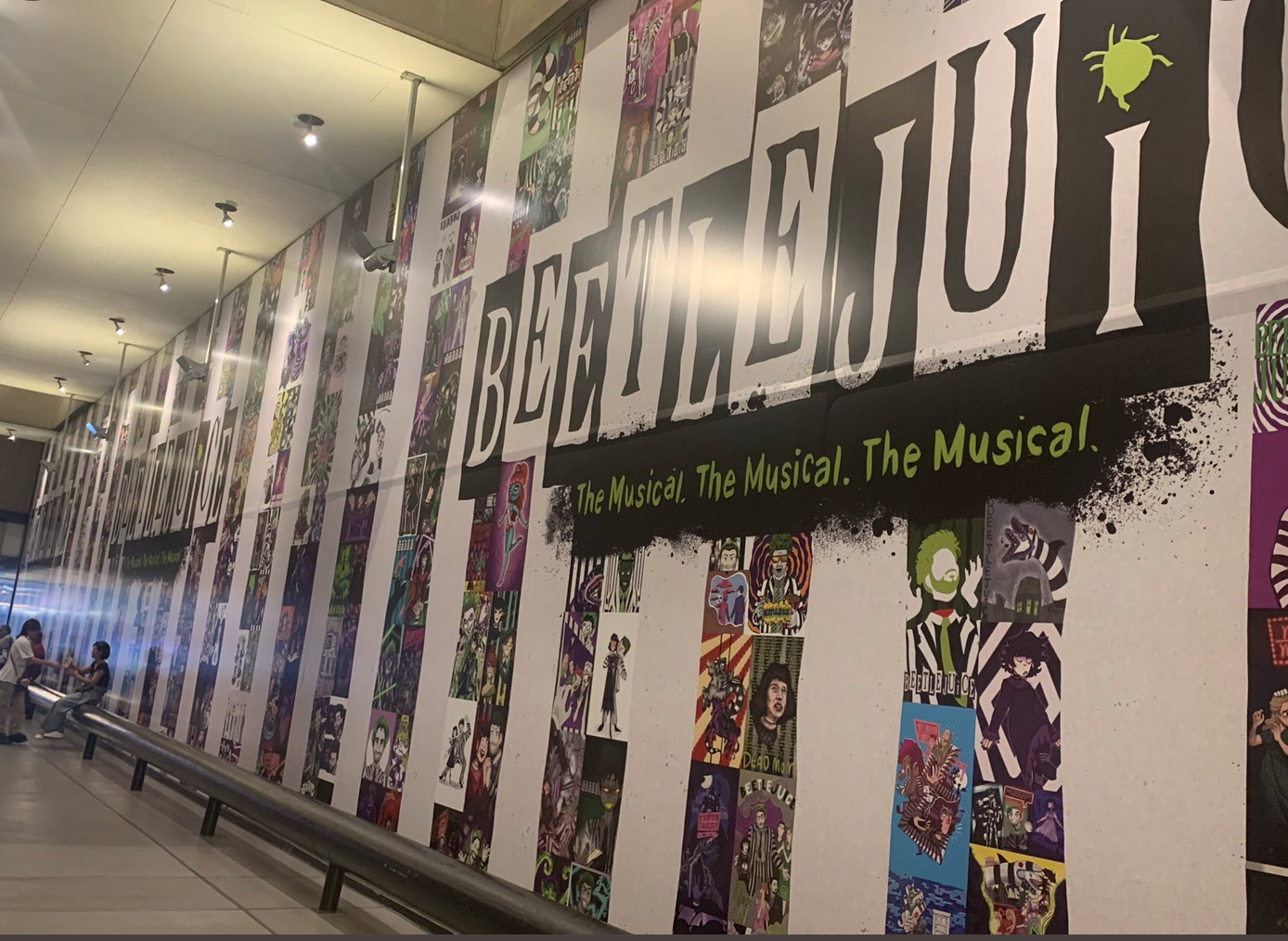
BEETLEJUICE premiered at the Winter Garden Theatre in April 2019; in December that year, it was announced that the theatre would be home to producer Scott Rudin’s new production the following spring of THE MUSIC MAN.,
As Playbill reported at the time,
“Though [Beetlejuice] has frequently grossed over $1 million in recent weeks (including breaking a house record over Thanksgiving week), the Shubert Organization, which owns the Broadway theatre and 17 others, has enforced the eviction as the production did not hit its contractual “stop clause” figure for two consecutive weeks in the spring. Its grosses hovered around $820,000 in May.”
BEETLEJUICE was duly announced to be due to close on June 6, 2020, with THE MUSIC MAN announced to replace it at the Winter Garden from that September.
In fact, as we now know, Broadway itself was entirely closed down, for its longest-ever stretch in history, from March 12, 2020, not reopening until September 2021. The production schedule for THE MUSIC MAN, too, was shifted in accordance with this, and that show was one of the first big new productions to re-open Broadway at capacity, previewing in December 2021 before formally opening on February 10 this year.
By the time it finally opened, its original producer Scott Rudin had officially stepped back from formal involvement in its day-to-day operations, after Rudin’s serial bullying of his personal staff was revealed.
Management responsibilities were ceded to British producer (and former Royal Court executive director) Kate Horton, who joined Rudin’s lead producing partners, billionaires Barry Diller and David Geffen, above the title. (There are, however, plenty of signs of Rudin’s continuing and pervasive influence over the show, including such stunts as making the first night critics attend the first night itself (and not a range of critics’ previews ahead of the official opening; as well as an advertising campaign that saw the show’s opening featured in prominent ads in the New York Times, a vanity spend that few shows bother with nowadays).
Anyway, it turns out that BEETLEJUICE is having the last laugh: it was announced last week that THE MUSIC MAN will close on Broadway in January 1, 2023, after a run of less than a year, instead of re-casitng its leads Hugh Jackman and Sutton Foster; in an interview with the New York TImes last week, Horton stated. “We managed to get Hugh and Sutton until the first of January, which is a remarkable commitment, and I felt really strongly that they have created such a unique event between them, trying to think of somebody who could follow on that became impossible, This was its own particular magic.”
Meanwhile, BEETLEJUICE is happily at home at the Marquis Theatre,, where last night it was packed (probably helped by smart producing: it is the only Broadway musical to currently play a Sunday evening).
It may not, perhaps, be the subtlest of musicals, but it is certainly one of the most fun, with plenty of metatheatre references to other musicals (the Brigadoon reference is a hoot; I also appreciated a reference to “Someone to ruin your sleep” from Sondheim’s BEING ALIVE).
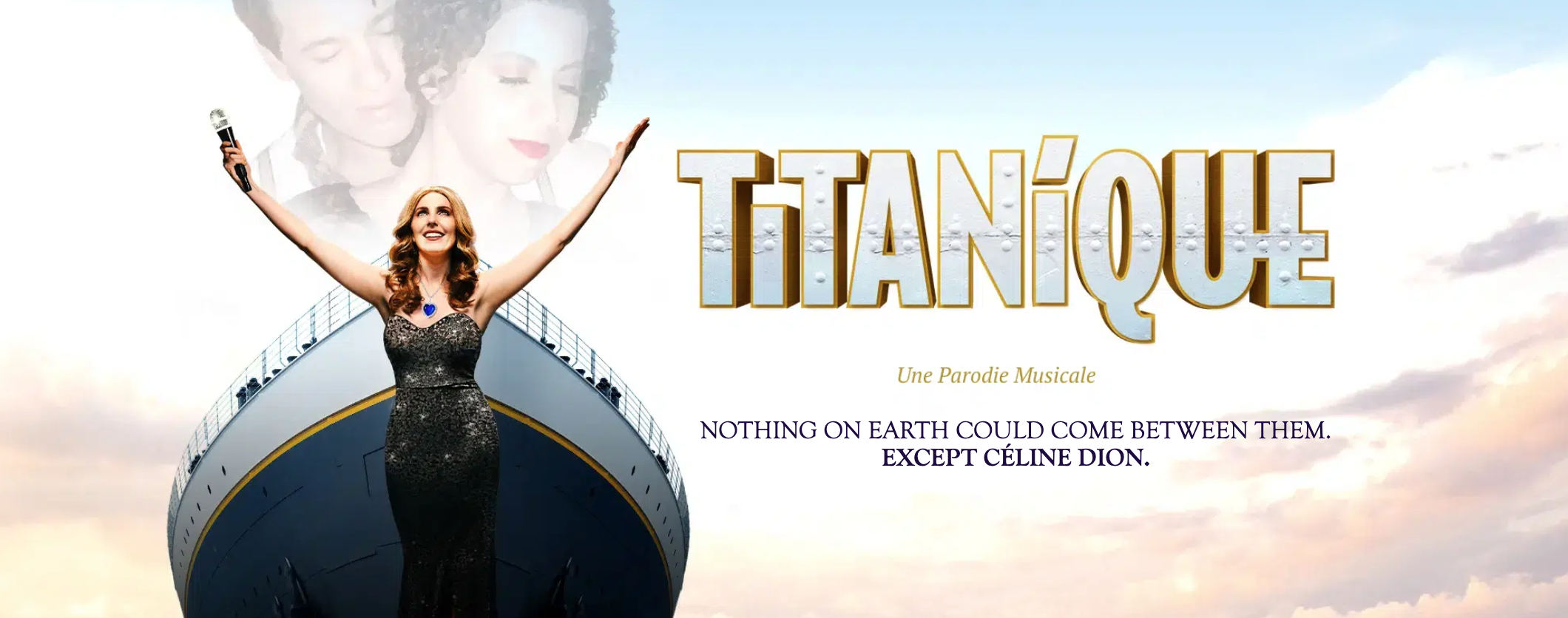
Off-Broadway, I caught another metamusical, TITANIQUE, at the Asylum Theatre in Chelsea, which uses Celine Dion songs to recreate scenes from the film TITANIC; an actor impersonating Dion is also our narrator. Again, this was not exactly subtle — but it was a hoot.

Finally, I also caught two productions currently in previews, so I won’t comment on them critically. The 1969 Broadway musical 1776 — a history lesson set to music about America’s Declaration of Independence — is being revived for the second time by Roundabout Theatre, who previously revived it in 1997; that was a traditional staging, and bored me so much I remember fleeing at the interval. The new production, co-produced with American Repertory Theatre in Cambridge, MA, does a much more radical intervention.
As a preview feature in the New York Times puts it, “1776 isn’t what it used to be. In 2022, a touchstone of national identity has become a culture-war hot potato. And 1776 [the musical], which arrives this month on Broadway in a new revival for Roundabout Theater Company, isn’t the same either. The revival, directed by Jeffrey L. Page and Diane Paulus, has the familiar rousing melodies (in new, rock-infused arrangements), star-spangled color scheme and corny dad jokes. But they’re delivered by a racially diverse cast of women, nonbinary and trans actors, whose embodiment, Paulus said, wakes the language up.”
Interviewed by the paper, Paulus commented,
“I want the audience to hold that dual reality, of what the founders were, but also a company of actors in 2022, who never would have been allowed inside Independence Hall”. As the piece goes on to say, “The idea, she said, using a phrase that has become something of a mantra for the show, ‘is to hold history as a predicament, rather than an affirming myth’.”
That’s a heavy weight of intention for the musical to carry, but — in the manner of HAMILTON — it releases fresh meaning to the show that makes it newly compelling. (It opens officially on October 6).
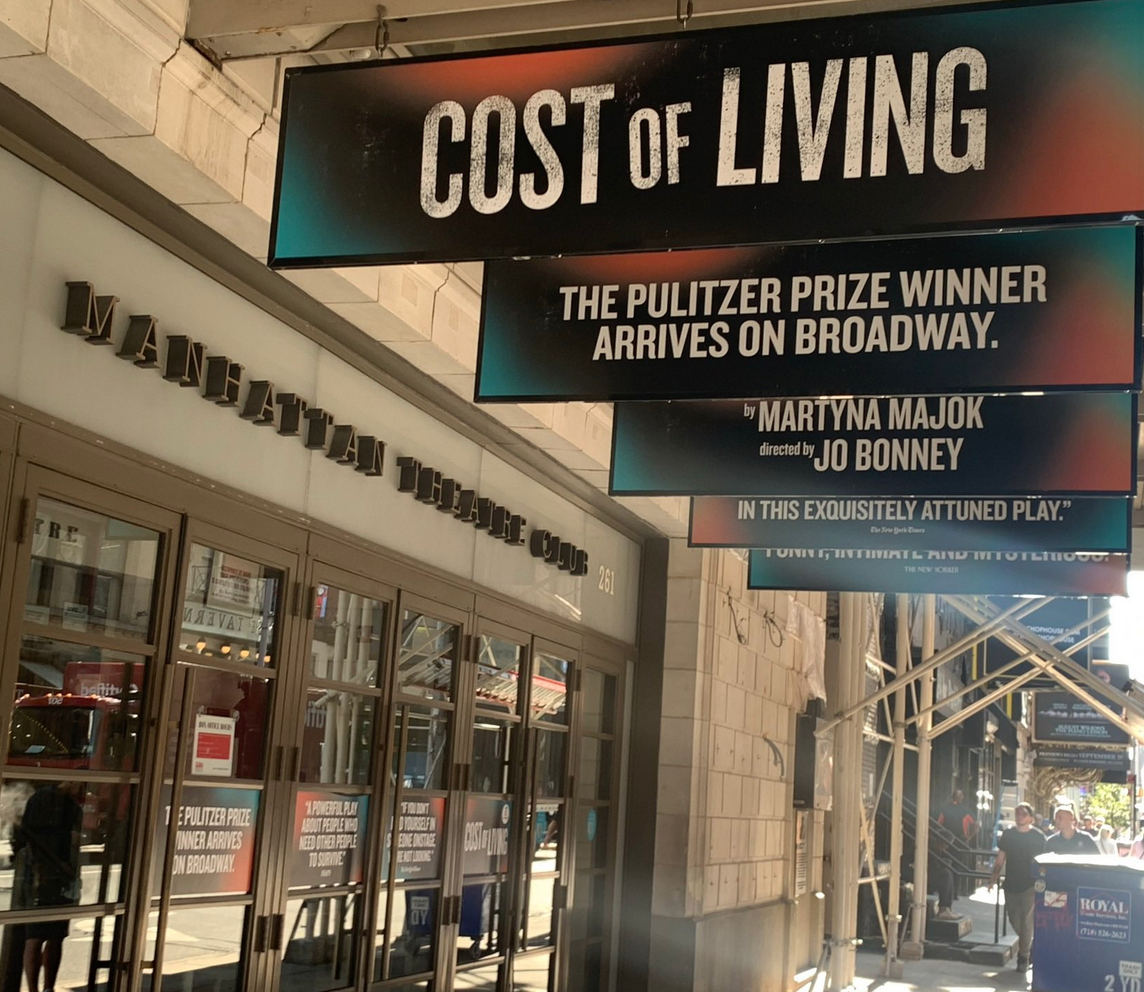
Also currently in previews is Martyna Majok’s COST OF LIVING, originally premiered at Manhattan Theatre Club’s Off-Broadway space at City Center in 2017, and now revived at their Broadway address, the Samuel J Friedman. Between the original production and its revival now, it has won the 2018 Pulitzer prize for drama
As Howard Sherman noted in a recent feature for The Stage,
“This fall, Broadway is all about the Pulitzer prizes – for drama, of course. Two shows new to Broadway won Pulitzers after their Off-Broadway premieres – Martyna Majok’s Cost of Living in 2018 and Stephen Adly Guirgis’s Between Riverside and Crazy in 2015. New productions of Arthur Miller’s Death of a Salesman, August Wilson’s The Piano Lesson and Suzan-Lori Parks’ Topdog/Underdog represent 1949, 1990, and 2002. Add in Lin-Manuel Miranda’s Hamilton (2016) and Michael R Jackson’s A Strange Loop (2020), and nearly 20% of Broadway is occupied by Pulitzer winners.”
It opens officially October 3; I saw it on Saturday, and although one of the four roles was being played by a very capable understudy, it was wonderful to see a really thoughtful, sensitive new play on Broadway.
SEE YOU ON FRIDAY
I’ll be back here on Friday. If you can’t wait that long, I may also be found on Twitter here: https://twitter.com/ShentonStage/ (though not as regularly on weekends)

